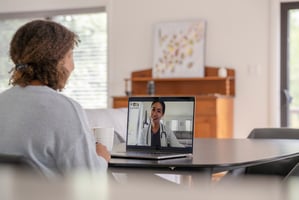New Federal Rules Boost Telehealth Flexibility When Treating OUD

As part of a flurry of end-of-term activity, the Drug Enforcement Administration (DEA) along with the U.S. Department of Health and Human Services (HHS) has finalized two rules that permanently expand some telehealth prescribing options and proposed a third rule that would create a new special registration for telehealth prescribing.
Expansion of Buprenorphine Treatment via Telemedicine Encounter
This final rule authorizes registered clinicians to prescribe controlled substances in Schedules III to V for the treatment of opioid use disorder (OUD) via a telemedicine appointment or an audio-only visit, without first seeing the patient in person.
APA has long advocated for a permanent extension to the telemedicine prescribing flexibility that was allowed during the COVID-19 public health emergency and later extended three times. This flexibility prevents lapses of care and expands access to OUD treatment to patients who might not have transportation or a psychiatrist in their area.
“This final rule is a huge win for our patients and colleagues, and key components were directly shaped by feedback from APA and allied organizations,” said Lief Fenno, M.D., Ph.D, assistant professor of neuroscience and psychiatry at the Mulva Clinic for the Neurosciences at the University of Texas at Austin. “The rule reduces the potential for gaps in treatment, lowers barriers to access, and expands the use of life-saving buprenorphine.”
Continuity of Care via Telemedicine for Veterans Affairs Patients
DEA and HHS yesterday also issued a final rule that applies only to VA patients who have previously received an in-person medical evaluation with a VA practitioner. For such patients, the final rule authorizes a different VA practitioner to prescribe Schedule II-V controlled substances via telemedicine, without being limited to a 30-day supply.
The rule stipulates that prescribing VA clinicians must first review the patient’s VA internal prescription database and prescription drug monitoring program (PDMP) data prior to prescribing controlled substances via telemedicine. If unavailable, clinicians are limited to providing a seven-day supply via telehealth.
Both rules take effect 30 days from their date of publication in the Federal Register, which is expected this week.
Special Registration Proposed for Telehealth Controlled Substances Prescribing
The DEA also proposed a new rule to establish three types of special registrations to allow for prescribing and dispensing of controlled substances by registered practitioners and online telemedicine platforms. The separation would mean that only specialized clinicians, such as psychiatrists, neurologists, and board-certified mid-level practitioners (hospice nurses), can prescribe Schedule II substances, while those without this “advanced registration” can prescribe Schedules III-V.
The proposed rule also makes heightened changes to prescriptions, recordkeeping, and reporting. For example, three years after implementation of the rule, clinicians must perform a nationwide PDMP check prior to prescribing controlled substances. For the first three years, clinicians must perform a PDMP check for the patient’s location, clinician’s location, and states with reciprocity agreements.
Public comments about this proposed rule will be due within 60 days after publication in the Federal Register, which is expected this week.
For related information, see the Psychiatric News article “APA Members Urge Congress to Protect Telehealth Access.”
(Image: Getty Images/iStock/Drazen Zigic)
Don't miss out! To learn about newly posted articles in Psychiatric News, please sign up here.





